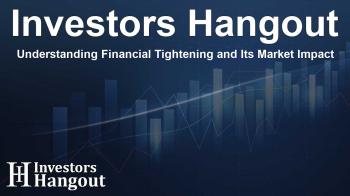Understanding Financial Tightening and Its Market Impact

Understanding Financial Tightening and Its Market Impact
The US dollar has been on a notable rise after breaking out from a prolonged trading range. This upward movement is largely in response to recently released data indicating persistent inflation pressures. Consequently, the Federal Reserve is likely to maintain its current stance for some time as it assesses the economic landscape.
The Technical Landscape of the US Dollar
From a technical standpoint, the dollar has established an 8-point trading base, moving between $100 and $108. This breakout suggests that the dollar could target levels above the highs seen in 2022. At this point, the chart does not show a significant presence of resistance levels, which could allow the dollar to continue its ascent. Nonetheless, it remains possible for the dollar to face resistance before it reaches the $114 highs.
The Implications of a Rising Dollar
While it's encouraging to observe strength in the US dollar, its rise typically signifies a reduction in liquidity. Investors often find this dynamic concerning, as a strong dollar can complicate market conditions.
Interest Rates and Their Impact on Market Conditions
In tandem with the dollar's rise, interest rates have been climbing, with the 10-year rate recently breaching its prior high from earlier in the year. However, it's worth noting that as of the latest trading data, this rate has pulled back below that crucial pivot point. This development raises questions about whether we've witnessed a legitimate breakout or merely a shakeout.
Understanding Breakouts vs. Shakeouts
In financial terminology, a 'shakeout' refers to a situation where prices temporarily break beyond key levels before reversing back. This phenomenon often causes some traders to exit their positions, only for the price to move back in their favor shortly afterwards. Conversely, a breakout signals a meaningful price move that upholds the prevailing market trend.
The Future of Financial Conditions and Its Effect on Stocks
As we navigate the current market conditions, it's essential to recognize the tightening financial environment, which is frequently correlated with negative outcomes for stock prices. My previous predictions regarding potential market softness for the upcoming year appear to be manifesting, underscoring the intricate relationship between currency strength and equity market performance.
Frequently Asked Questions
What is financial tightening?
Financial tightening involves reducing the availability of money and credit, often through measures such as interest rate hikes.
How does a rising US dollar affect the economy?
A strong US dollar can lead to decreased demand for exports and may contribute to slower economic growth.
What is a breakout in financial markets?
A breakout occurs when the price of an asset moves beyond a defined level of support or resistance, indicating a potential trend continuation.
What does a shakeout mean in trading?
A shakeout is when the price momentarily breaches a key level, only to quickly reverse, causing investors to be 'shaken out' before the price moves in their favor.
Why are rising interest rates significant?
Rising interest rates can increase borrowing costs, which may lead to reduced consumer spending and business investment, impacting overall economic growth.
About The Author
Contact Addison Perry privately here. Or send an email with ATTN: Addison Perry as the subject to contact@investorshangout.com.
About Investors Hangout
Investors Hangout is a leading online stock forum for financial discussion and learning, offering a wide range of free tools and resources. It draws in traders of all levels, who exchange market knowledge, investigate trading tactics, and keep an eye on industry developments in real time. Featuring financial articles, stock message boards, quotes, charts, company profiles, and live news updates. Through cooperative learning and a wealth of informational resources, it helps users from novices creating their first portfolios to experts honing their techniques. Join Investors Hangout today: https://investorshangout.com/
The content of this article is based on factual, publicly available information and does not represent legal, financial, or investment advice. Investors Hangout does not offer financial advice, and the author is not a licensed financial advisor. Consult a qualified advisor before making any financial or investment decisions based on this article. This article should not be considered advice to purchase, sell, or hold any securities or other investments. If any of the material provided here is inaccurate, please contact us for corrections.

